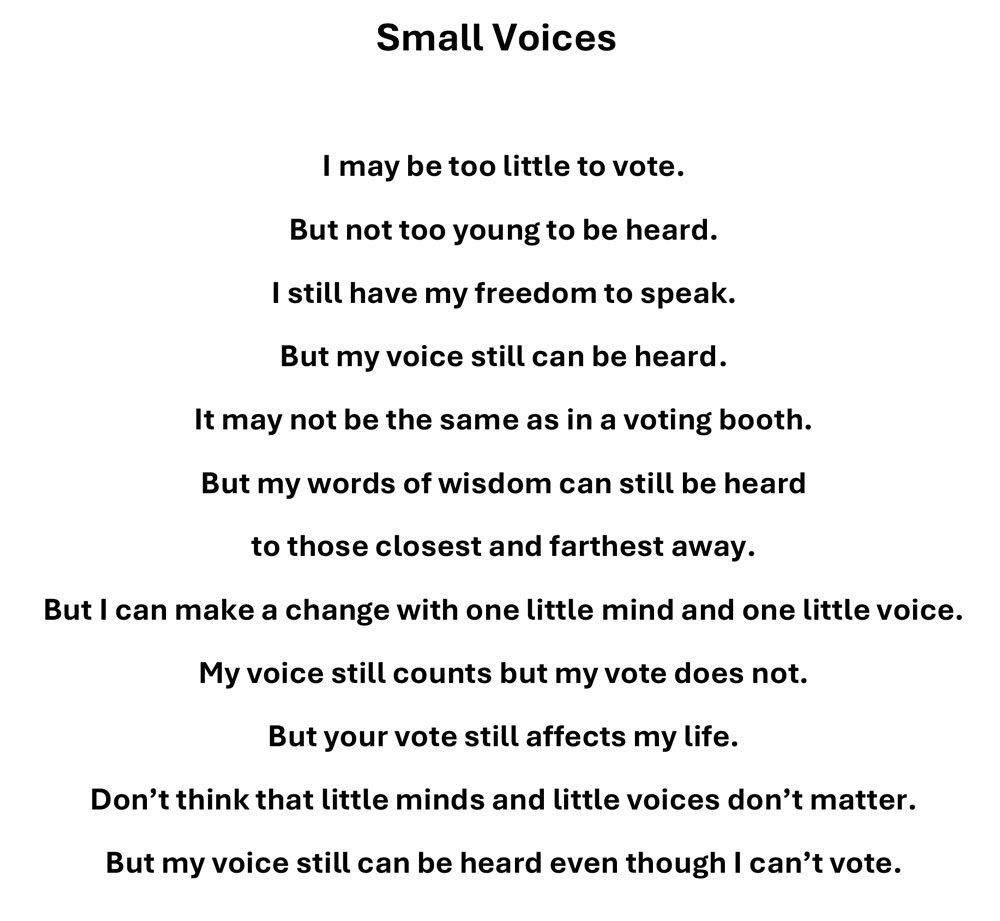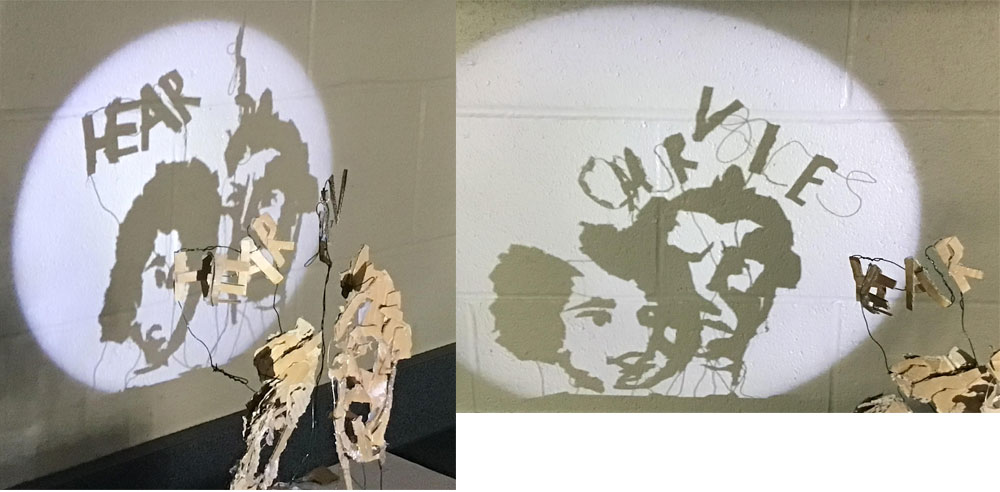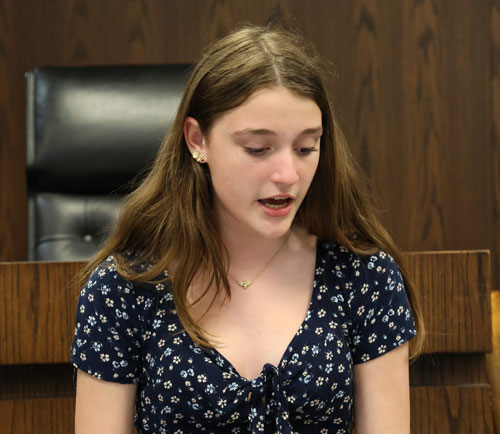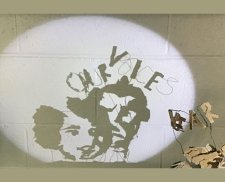2024 Law Day Art & Essay Competition Winners
The theme of the 2024 Lycoming County Law Day art and essay competition, "Voices of Democracy," recognizes that in democracies, the people rule. Here are the winning entries:

Amelia Robbins
Homeschooled
The Electoral College is an outdated and flawed system that, in its current state, does not accurately reflect the voice of the American people. Many improvements could be made to the current election process in the United States. The current system has a major flaw in that the votes of citizens in smaller, less populated states carry more weight than those of citizens in bigger, more populated states. Another issue is the winner-take-all system set in place for distributing electoral votes to candidates. A third problem with the Electoral College is that the electors are not bound to vote for the winner of the state's popular vote ("Problems with the Electoral College").
Under the current system, citizens of less populated states have more voting power than those of more populated states, which is one of the primary issues with the Electoral College. This is due to the uneven distribution of electors between the states. In the 2020 election, Ohio had 18 electors and Rhode Island had four. According to the 2020 census, Ohio received one elector per 653,333 people, while Rhode Island with four electors received one elector per 273,500 people ("Ohio - Place Explorer"; "Rhode Island - Place Explorer"). Those numbers demonstrate that in states with smaller populations, the votes of each citizen are more valuable than those from states with larger populations. If votes were proportionally distributed, two of Rhode Island's votes would go to Ohio, giving them 20 electoral votes. With this adjusted distribution, Rhode Island would only have 2, giving them one elector per 547,000 people, and Ohio would get one electoral vote for every 588,000 people, a much closer and more equal distribution than the current system. Although this is not the only instance of this happening in the U.S., it is one of the most significant differences in numbers.
The system's distribution system of electoral votes is also flawed. In every state except Maine and Nebraska, winning a state results in receiving all of that state's electoral votes ("Distribution of Electoral Votes"). This is a problem because it discourages candidates from campaigning in states with a clear choice of candidate. Because of this, fewer citizens' voices are heard when deciding the candidate who wins the election since the minority's votes get drowned out by the majority's votes. Instead, a Republican candidate would want to campaign in an undecided swing state rather than a very Democratic state. A solution to this is the method used by Maine and Nebraska, which assigns each congressional district one electoral vote, and whichever candidate wins that district gets the electoral vote from that district. Two extra votes are allocated to the winner of the state's popular vote by this system. Although there are many flaws in this solution, it still shows a slight improvement from our current system.
The final issue with the Electoral College system is that electors are not bound to vote for the candidate who wins the state's popular vote. The US Constitution does not restrict electors from voting for anyone they choose. While 37 states, including Washington, DC, have made laws binding electors to vote for the winner of their popular vote, that doesn't stop "faithless" electors from bypassing the law and just getting charged a fine. 165 electors have deviated from voting for the winning candidate since the establishment of the Electoral College. A solution to this problem is for more states passing the Uniform Faithful Presidential Electors Act, which makes electors vote for the winning candidate and replaces them if they do not vote as promised. ("Presidential Elections").
These three Haws are not the only ones in our electoral system. In fact, there are many more issues with the system. The Electoral College maintains a two-party system by designating all third-party candidates as spoilers who cannot win the election but still have an impact on its outcome ("Problems with the Electoral College"). In the event of a tie in the Electoral College, the House of Representatives takes over the presidential vote and the Senate takes presidential vote. This can be an issue if the two chambers of Congress have a different majority, as they do currently, it could end with the president and vice president being of opposing political parties. The Electoral College system has many flaws, but these are just a few of them. These problems make it evident that the Electoral College is an outdated and flawed system that
fails to represent the voices of the American people.
Elias Rodriguez - Grand Prize Winner

Tala Zaldivar
Loyalsock Middle School
Do you feel that it is okay if your vote for the presidential candidate does not count as much as you think it does? When we use the Electoral College, we don’t have a direct say in who becomes president. Take the 2016 presidential election for example. Hillary Clinton had 5 million more votes than Donald Trump did. Why did he win then you ask? Trump won because the Electoral College gave the majority of their votes to him. The Electoral College should not be used.
The Electoral College is a way that we choose our president by using our states’ chosen electors to vote based on a state’s population and who won in the state election. The electors use the winner in the state presidential election to choose which candidate they will cast their vote for. However, there are some flaws with the Electoral College.
First off, when we vote, the winning candidate in the state election receives the electors votes in the Electoral College. Although, if the electors in the Electoral College do not want to vote for the most popular candidate, they technically do not have to. This is part of what makes the Electoral College worse than it is helpful.
Second, the Electoral College was created when the Constitution was made and is in the Constitution, and that is why Congress finds it hard to change. The Electoral College was made to choose the best candidate for the country, but sometimes the Electoral College may not be the best for the country. Times change, and so should the laws in our country. For example, just like women and black people were not allowed to vote and they are now, we should be able to change other unfair laws. We should be able to directly choose who we think is right for our country.
Finally, voting for president should be just like voting for anything else in this country. When we vote, all our votes should count equally. The Electoral College causes our votes to not count equally. Let’s say that you live in Wyoming. Your vote would count, if the person you chose won in your state, for three Electoral votes. If you lived in California, your state’s majority of votes would count toward 55 Electoral votes, even though California has over 58 times as many people. It would be better for each vote to count as one vote overall.
There are some advantages to the Electoral College such as the fact that it gives more power to the smaller states and more recognition than they would have normally. I do not agree with this however, and I think that giving more power to the smaller states reduces the rights of the individual. Another advantage to the electoral college is that it increases the campaigns in smaller states and cities because presidents want those few electoral votes. I do agree that the smaller states should get recognition, but it should not be because the smaller states get more vote per person.
It would be better for our country if we did not use the Electoral College at all. When we use the Electoral College, our votes do not count as much. It seems silly to run a country using laws from the 1700s in a modern society that no longer fit due to the evolution of our lives and our votes should count as what they are. The next time you vote, think about the Electoral College, about your vote and how it should count, and how it does count.
Ethan Collins

Lila Butters
Loyalsock High School
Time For a Change
The Electoral College is how our vote for a president matters but isn't it supposed to be Americans who choose our president? We were taught that we Americans can choose who we want for president, but later you learn that you're technically just voting for an elector and they're the ones who vote for you. In this essay, I am going to discuss why I think we should have the American people voting, not electors.
One of the things that bothers me the most is how do we know the electors are voting for who we want? There have been cases when electors didn't vote for who they were supposed to. Most Americans don't even get to choose who our electors are. The only way you would be able to choose an elector is if you were at the state party convention and you would nominate a person then take a vote.
I also think that more people would vote if we didn't have the Electoral College. Many people want to abolish the Electoral College. I also think that there might be some honest electors who vote for who they are supposed to. I do believe if we had a better system and listened to the people's vote, we might get more people to vote knowing that they're the ones who voted and their vote matters a lot. Under the Electoral College System, if there was no majority the House of Representatives would choose the president and the Senate would choose the Vice President. Americans aren't even the ones who vote if there is no majority.
When the votes are in, you might read where it shows the popular vote and electoral vote count. There have been many times in history when one candidate got more popular votes than electoral votes and there have been times when a candidate was losing in popular votes and won the election because of the electoral count. Examples are Jhon Quincey Adams in 1824, Rutherford B. Hayes in 1876, Benjamin Harrison in 1888, George W. Bush in 2000, and Donald Trump in 2016.
The Electoral College was established in 1787. They established the Electoral College, so they didn't have Americans voting directly or Congress deciding because they said the American people weren't fully informed about the candidates. But in this day and age, now people watch the news, read a newspaper, or even listen to the radio and you're going to hear about the next election. I do think Americans are more informed.
On September 18, 1969, the House of Representatives voted to dismantle the Electoral College. It had to go through the Senate a year later and there was a filibuster. Southern lawmakers were intent on keeping the Electoral College. The Senate came five votes shy of breaking the filibuster.
The Electoral College was made 237 years ago and at that time slavery was happening. African American people were considered three fifths of a vote until after the Civil War, then they were counted as one whole vote. They still couldn't vote until 1870 and it was hard for them because of the Jim Crow laws. It wasn't until the Voting Rights Act of 1965 when progress was made. The Electoral College became a pillar of white supremacy. The background of the Electoral College is not good, we need to make a change.
This essay has been an extraordinary learning opportunity for me and maybe others. I care about democracy and about our elections and I want them to be as fair as possible. That means having the American people vote for our president. The American people are intelligent, and I believe they should have this incredible right for voting for their president without electors. I know there are some countries out there who don't even get to choose, but let's do better and let's hear the American peoples vote.
Lyla Robbins
Even if I was too young to vote I would want to be involved because it will impact me, my friends, family and people around me and our future. I would research the candidates
background, their motivation, solutions to problems, their separation and hopes for the future. Kids should also learn about voting by asking your parents to take you to learn about voting at the polls. Hanging posters is also helpful. Understanding the election can help in future years when you have to vote.
I would make certain the candidates really care about the people. Then, I would hang posters in common places like coffee shops, grocery stores, churches, bu~ stops and parks. I would then talk to people I know such as my parents, relatives and people like that. Stating my idea helps but you should also get out there and do something like making short little videos. It will make a huge difference if people saw a kid making a change. You might just inspire others to vote!
Grownups can take kids to the polls to learn how the process is done. Everyone should !mow your vote can make a difference. My opinion is education on the election shonld be increased. Leaming to vote now helps when you will vote in the future. Now you know a few ideas to help even if you're too young to vote.
Adeline Koshy
Quentin Gallagher
Schick Elementary
If you are not old enough to vote what are other ways that you can participate in our democracy/democratic government? Well you could first research which candidate is the best. You can ask other people if you could put out signs for the candidates in front of their yards. These are some things you can do to participate in an election in your neighborhood.
On the signs that you make you could make it educational and write what each candidate stands for. You could also go to a place a lot of people go to (malls, farmers markets, downtown) and tell them about each candidate. If someone isn't sure about voting or if their vote won't make a difference tell them how Texas became a state (by just one vote) one vote really makes a difference if you use it. Jameson Shoemaker was an Indiana farmer and he was plowing his fields when his neighbor busted in to tell him it was voting day. Jameson immediately rushed to the polls and voted for Madison Marsh. The votes were tied before his vote causing his vote to be the tie breaking vote. Madison Marsh later had to vote and chose Jam es Harrigan who in later time had to vote and chose for Texas to become a state by just one vote. That is how Texas became the 28th state. One vote really makes a difference .that might change their mind about voting.
Those are all great ways to help out in an election. Even though you can't vote, it's a way for you to prepare yourself in the future when you have to vote. VOTE! YOURS MAY BE THE TIE-BREAKING VOTE.
Abigail Koshy

